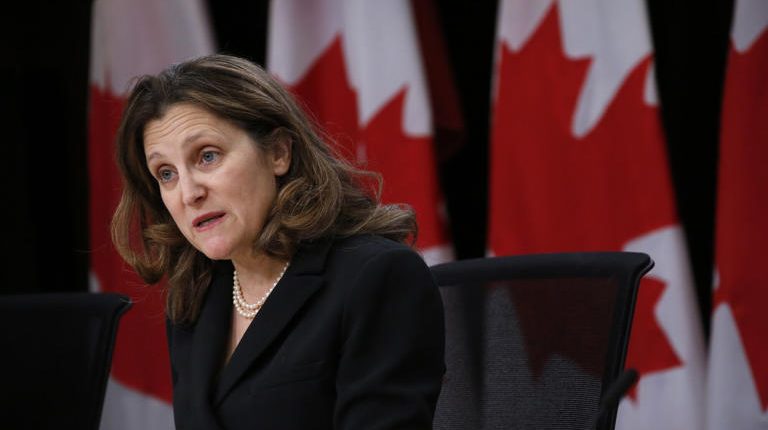Canada’s Finance Minister Chrystia Freeland has resigned from her post, citing disagreements with Prime Minister Justin Trudeau on how to respond to incoming President Donald Trump’s threat of tariffs.
She announced her resignation in a letter to Trudeau on Monday, in which she said the two have been “at odds about the best path forward for Canada”, and pointed to the “grave challenge” posed by Trump’s policy of “aggressive economic nationalism”.
Freeland said the decision comes after Trudeau informed her last week that he no longer wanted her to be his government’s top economic adviser.
Her resignation came hours before she was due to provide an annual fiscal government update in parliament.
In recent days, a dispute has emerged between Canadian Prime Minister Justin Trudeau and Deputy Prime Minister Chrystia Freeland, particularly over a policy aimed at sending a C$250 ($175; £139) cheque to every eligible Canadian. The two reportedly disagreed on this policy, with Freeland expressing concerns about its cost at a time when Canada faces growing deficits.
In her resignation letter, Freeland emphasized the need for Canada to keep its “fiscal powder dry” in light of potential threats from US President-elect Donald Trump’s proposed tariffs. Trump has pledged to impose a 25% levy on imported Canadian goods, which economists warn could severely harm Canada’s economy. Freeland referred to the tariffs as a “threat” that must be taken “extremely seriously,” urging the country to push back against “America First” economic nationalism and prioritize unity in the face of this challenge.
The policy in question—the C$250 cheques for Canadians earning less than C$150,000 annually—was intended to cost the federal government C$4.68bn. Additionally, Trudeau proposed a temporary tax break on essential items during the holidays, which would lead to a C$1.6bn loss in tax revenue. Freeland’s office had expressed concerns about the economic implications of these proposals, suggesting they were unwise given the country’s fiscal situation.
While the tax holiday has been approved in the House of Commons, the cheque program faced obstacles when the New Democratic Party (NDP) indicated it would not support the measure unless it was expanded. A poll showed that many Canadians viewed the cheques as a political maneuver to boost Trudeau’s waning popularity.
Freeland, a close ally of Trudeau and Canada’s finance minister since 2020, played a significant role in steering the country through the pandemic and its aftermath. She replaced Bill Morneau, who resigned in 2020 over a dispute with Trudeau regarding government spending policies and allegations of conflict of interest.
Following Freeland’s resignation, several cabinet members, including Patty Hajdu, Minister for Indigenous Relations, and Anita Anand, Minister of Transport, expressed their respect and sadness over her decision. Despite stepping down from her position as deputy prime minister, Freeland intends to remain a Liberal Member of Parliament and will run for re-election in the upcoming federal election.
The resignation raises questions about whether the fall economic statement, scheduled for Monday, will go ahead as planned. Government officials are currently determining the next steps.





